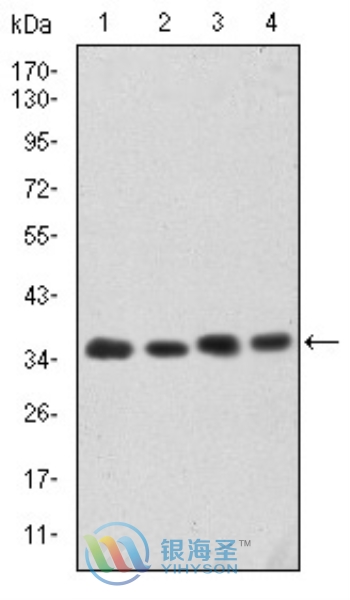AMM1020-61
[Monoclonal Antibody]
CDK5 Mouse Monoclonal Antibody

www.yhsbio.com
market@yhsbio.com
support@yhsbio.com
+86-21-54651191
Room 703,Building 6,333# Guiping
Rd.,Xuhui District,Shanghai,China
market@yhsbio.com
support@yhsbio.com
+86-21-54651191
Room 703,Building 6,333# Guiping
Rd.,Xuhui District,Shanghai,China
DATASHEET
| Species: | Mouse |
| Applications: | WB IHC ELISA ICC FC |
| Immunogen Range: | A purified recombinant fragment of human CDK5 expressed in E. Coli |
| Clonality: | Monoclonal Antibody |
| Isotype: | IgG1 |
| GENE ID: | 1020 |
| Swiss Prot: | Q00535 |
| Synonyms: | CDK5, CRK6, Cell division protein kinase 5, EC 2.7.11.22, PSSALRE, TAU protein kinase II catalytic subunit, TPKII catalytic subunit, Tau protein kinase II catalytic subunit, kinase Cdk5 |
| Purification: | Affinity chromatography |
| Storage: | Store at -20°C or -80°C in PBS with 0.02% sodium azide and 50% glycerol. Avoid freeze/thaw cycles. |
| Background: | CDK5 is a protein kinase of the CDK family. Unlike other members of this family, it is not activated by cyclins but by p35 (CDK5R1) and p39. An important regulator of neuronal positioning during brain development. May also play a role in synaptogenesis and neurotransmission. Substrates include TAU, MAP2, NF-H and -M, Nudel, PDE6, beta-catenin, amphyphysin, dynamin I, synapsin 1, Munc-18, and NMDA receptor 2A. Plays a role in myogenesis, haematopoietic cell differentiation, spermatogenesis, insulin secretion, and lens differentiation. Implicated in the pathology of neurofibrillary tangles and formation of senile plaques, hallmarks of Alzheimer?s disease. Induces tau phosphorylation and aggregation and neurofibrillary tangle deposition and neurodegeneration in in vitro and in vivo animal models. Brain samples from Alzeimer?s pateints show elevated CDK5 activity. |
| Caculated MW: | 35 kDa |
| Observed MW: | Refer to Figures |
| Applications: |
WB 1:500-1:2000 IHC 1:200-1:1000 ICC 1:200-1:1000 FC 1:200-1:400 |
| Reacitivity: | Human, Monkey, Rat |
For research use only. Not intended for diagnostic or therapeutic use!
Additional information
